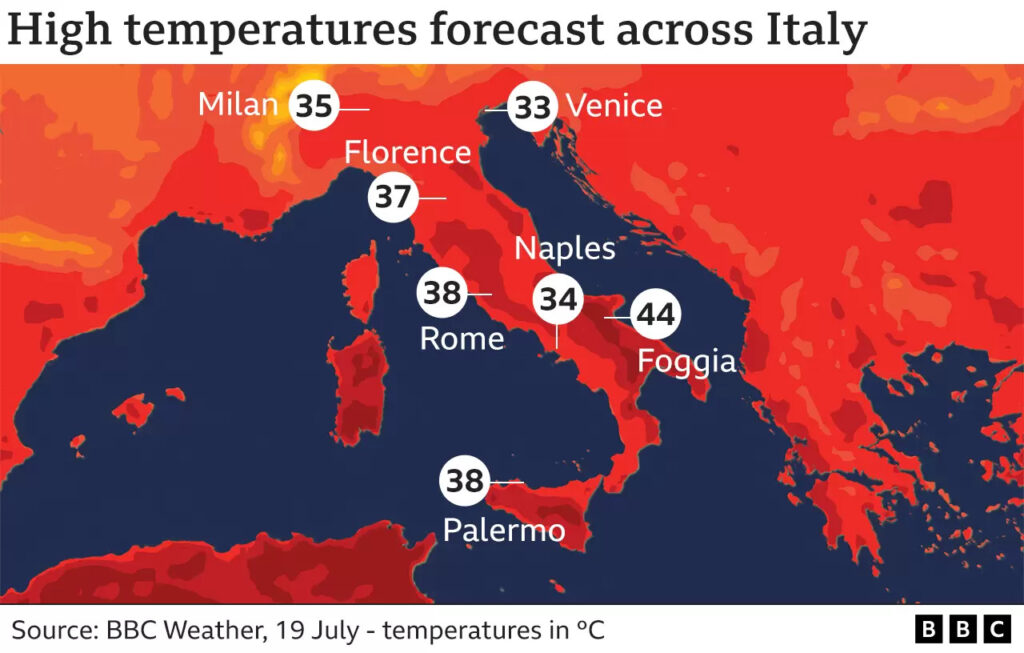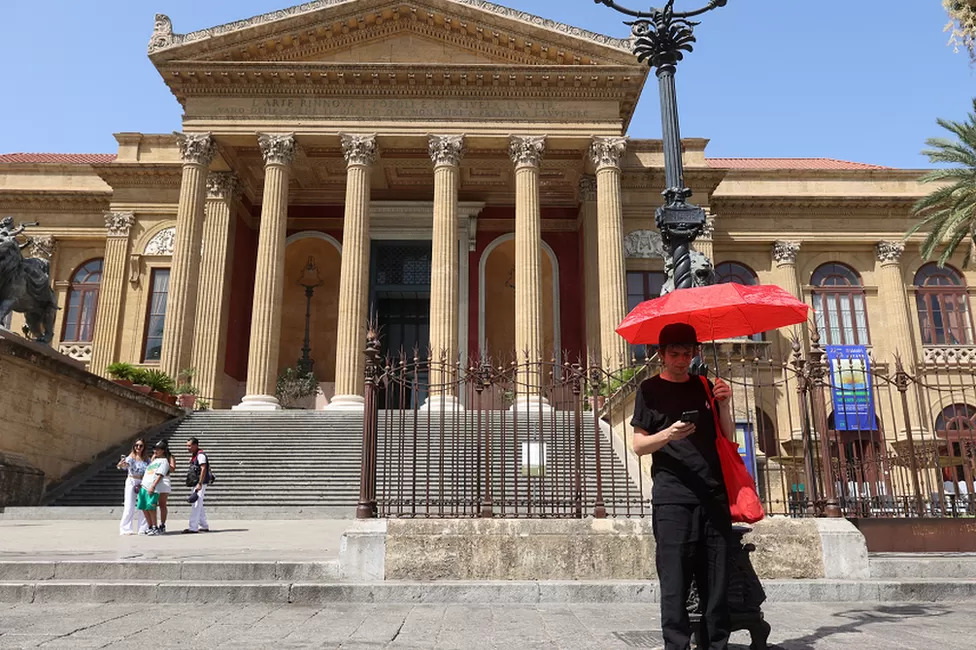Red alerts for extreme heat are in place in most of Italy’s main cities as a heatwave intensifies in Europe.
Temperatures are expected to peak on Wednesday, with 23 cities on high alert – from Trieste in the north-east to Messina in the south-west.
The warnings mean the heat poses a threat to everybody, not just vulnerable groups.
Wildfires are also raging across the continent, including in Greece and the Swiss Alps.
Millions of people in the northern hemisphere are being affected by scorching temperatures.
It is being caused by a high pressure system bringing warmer, tropical air, south of a jet stream currently stuck over central Europe.
And the heat is forecast to last through Wednesday across most of southern Europe, following several days of temperatures in excess of 40C (104F).
BBC Weather says parts of the Italian islands of Sardinia and Sicily will be the hottest again, with highs of around 46C or 47C.
The heatwave, which has swept across the country, has been described by local media as settimana infernale – or “week of hell”.
Many buildings on the island of Sicily are not equipped to deal with temperatures this high. Lots of families live on the ground floor, in apartments with very few windows, and it is quite common for large families to live together in small spaces.
Two people – a man and woman aged 69 – were found dead in their homes in the Sicilian capital Palermo on Tuesday, with several local newspapers attributing their deaths to the heat.
In the south of Italy, which is poorer than the north, many cannot afford air conditioning, or even fans.
The heat is particularly tough on homeless people.
Sergio Ciresi, a priest running Catholic charity Caritas, which offers a shower service and homeless shelters in Palermo, told the BBC the heat was “making people more impatient and short-tempered”.
“In the last few days we noticed people getting angry a lot more easily, and starting fights with each other.”
There have also been power cuts on the island as a result of high demand for air conditioning.
The Italian health ministry has asked emergency rooms across the country to activate so-called “heat codes”, assigning a separate group of medical staff to treat people who come in with symptoms caused by the heat.
Similar measures were brought in at the start of 2020, when Italy became the epicentre of the Covid pandemic in Europe.
There has been a 20% increase in the number of patients being admitted with heat-related symptoms, according to the health ministry.
“We are seeing an increase in admissions of patients with headache, tachycardia, dehydration and confusion,” said Dr Tiziana Maniscalchi, director of emergency medicine at a hospital in Palermo.
She said some of her patients had died, with exposure to extreme heat a contributing factor.
“For people who already have a fragile health, being exposed to these temperatures can have devastating consequences,” she said.
“I am worried, because the people who will pay the price are the most vulnerable and frail.”
A new record-high temperature of 41.8C was reportedly recorded in the capital Rome on Tuesday.
Red alerts also remain in place across Spain, Greece and parts of the Balkans.
Temperatures are expected to fall on Thursday for many in Europe, including northern Italy – where red alerts will be removed for six cities.
But BBC Weather’s Matt Taylor says that temperatures could be in the mid to high 40s for many in the central and eastern Mediterranean by the weekend and carrying on into next week – which could potentially come close to breaking records.
Tunisia in North Africa is also expected to register 50C in some spots, he added.

The UN weather agency, the World Meteorological Organization, has warned that the heatwave in Europe could continue into August, and that the extreme temperatures sweeping the globe are the new normal in a world warmed by climate change.
In Greece, staff at the Acropolis in Athens, one of the country’s top tourist attractions, will stop working for four hours a day from Thursday in protest at working conditions during the heat, a union representing its workers has said.
Multiple wildfires have also swept across the country since Monday – including one which led to the evacuation of 1,200 children from a summer camp.
The most severe fire burned in the Dervenochoria region, north of Athens. Others also continue to rage in the towns of Loutraki – near the city of Corinth – and in Kouvaras, south of the capital.
In Mandra, west of Athens, residents have told the BBC damage from fires could have been avoided if emergency crews had arrived earlier.
The Greek fire service said it was doing the best it could to fight wildfires in very poor weather conditions, adding the “main concern is to protect lives, save belongings and the forests”.
Some have levelled criticism at the government, claiming there are not enough firefighters to respond to the number of blazes currently raging in the country.
Greek Prime Minister Kyriakos Mitsotakis, who cut his trip to Brussels short this week in wake of the fires, said the climate crisis was the main factor behind the blazes.
Mr Mitsotakis has faced these criticisms before, apologising in August 2021 for failures in tackling that summer’s wildfires.

Scientists have long-warned that climate change will make heatwaves more frequent, more intense and last longer in duration.
Experts say Europe in particular is warming faster than many climate models predicted.
More than 61,000 people were estimated to have died from the heat in Europe last year, and there are fears this year will be similar.
Source : BBC

